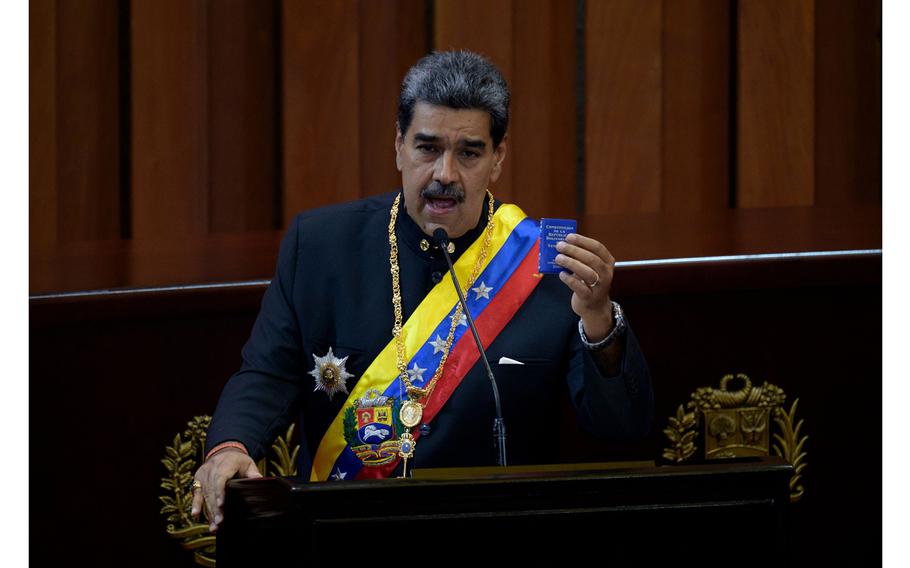
Venezuela’s Nicolas Maduro speaks at the Supreme Court in Caracas on Jan. 31, 2024, after his government bared Maria Corina Machado from running in this year’s presidential elections. (Gaby Oraa/Bloomberg)
Venezuela’s President Nicolas Maduro has so brazenly disrespected his promise for free and fair elections that allies in Colombia and Brazil took to publicly condemning his crackdown on the opposition.
Barring the opposition’s primary winner, Maria Corina Machado, and her little-known substitute, Corina Yoris, from running in this year’s presidential race are among the latest violations of the deal that Maduro struck five months ago with President Joe Biden’s administration to allow democratic elections in exchange for the removal of some of the crippling sanctions imposed years ago on the crisis-torn country.
By the Venezuelan opposition’s tally, the regime has now broken terms of the deal at least eight times.
Each snub raises the volume on an increasingly uncomfortable question for officials in Washington: whether to reimpose crucial oil and gas sanctions during an election year. Migration has emerged as a key issue for US voters, and Biden would be hard-pressed to take any steps that could worsen the economic or political situation in a country that has already sent so many people to the US southern border.
“Washington is in a difficult position,” said Geoff Ramsey, senior fellow at the Atlantic Council’s Adrienne Arsht Latin America Center. “The challenge is how to reimpose sanctions while still retaining a degree of leverage over Maduro, keeping the government at the table.”
The US remains “deeply concerned” about the Maduro government’s actions ahead of elections, State Department spokesman Matthew Miller told reporters in Washington on Thursday.
“There’s a general license that expires next month,” he said. “I’m not going to make any determinations from here about what decision we will take then, but we have been very clear with Maduro and his representatives: We’re going to be watching Maduro’s actions and making determinations about how we will proceed.”
It was a reference to a request for Venezuela to follow through on democratic commitments or face reinstated oil and gas sanctions.
The most likely scenario is that the administration lets the “general license 44,” which authorizes transactions involving the oil and gas sector in Venezuela, expire unceremoniously, three people with knowledge of the plans have said. The Biden administration would still retain “license 41,“ which authorizes Chevron Corp. to produce crude oil and petroleum products in its projects in Venezuela, one of the people said. They all requested anonymity to talk about the plan as it’s not yet public.
In January, after a Venezuelan court ruling ratified Machado’s ban on running for public office, the US revoked a license that allowed dealings with state-owned gold producer Minerven.
Failing deal
It was criticism over gas prices and how major US cities’ resources were strained by the massive migration from Venezuela that led the Biden administration to engage in direct talks with the Maduro regime in mid-2023. As part of those talks, the parties accomplished the unexpected, ultimately starring a blockbuster prisoner swap that included Maduro’s financier, Alex Saab, and a Malaysian defense contractor known as “Fat Leonard” wanted by the US.
Biden’s closest advisers, along with many Democrats in Congress, have long seen applying maximum pressure on Venezuela as a counterproductive strategy that strengthened Maduro’s grip while exacerbating the suffering of ordinary Venezuelans, with the sanctions merely driving even more people to flee to the US.
However, Venezuela’s economic stabilization in and of itself is unlikely to bring back all of its citizens who’ve left. A political change is the biggest incentive for them to return, according to a poll conducted by public opinion firm GBAO for Colorado-based nonprofit organization PAX sapiens. Venezuelan analysts are also predicting that without a political change, there will be another migration wave of about 2 million Venezuelans.
When asked during a webcast last month if she felt she had enough support from the US, Machado only said that both Democrats and Republicans “understood what Venezuela means in terms of national security and security for the whole hemisphere, what migration means at this point.”
Last week, when the Maduro government issued arrest warrants for nine members of her team in one fell swoop, she took a harsher tone.
“The international community says that they want free, clean elections, that they support the Barbados Agreement,” Machado, visibly disturbed, said from her party’s headquarter in Caracas. “From the international community, we expect much more than good wishes.”
Maduro has said his government is prepared for renewed sanctions, leaving the ball in the US’s court.
With assistance from Travis Waldron, Eric Martin, Jennifer Jacobs and Iain Marlow.